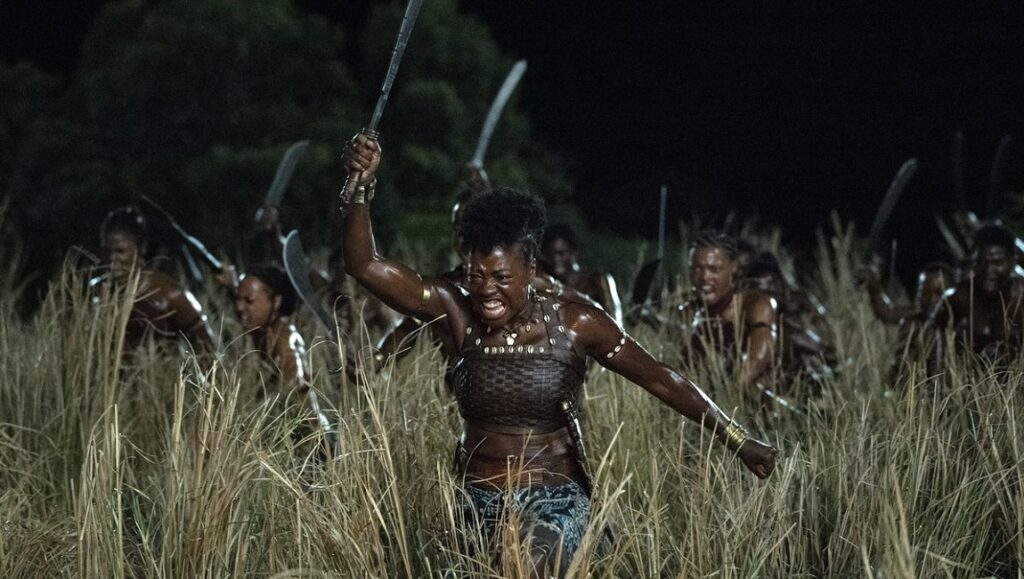The Woman King flattens its feminist appeal into Disney-fied girlboss energy and executes what’s left of its vision in both conventional and calculated ways.
What’s one to do with a motion picture like The Woman King? Watch it, obviously — but what about after? When contemplating what one’s just seen, what set of value judgments should be implemented in terms of establishing a discourse? These basic questions should be prompted by every great piece of art, and yet, in the case of The Woman King, they’re more than simple talking points to establish rhetorical banter. Gina Prince-Bythewood’s latest is a radical piece of feminist filmmaking — yet, that’s more or less a foregone conclusion when compared to the traditionally chauvinistic parameters of contemporary Hollywood filmmaking practices. If anything, the film’s vaguely surface-level feminist subtext gives it a pass a to indulge the same conventional clichés as other films of its ilk. Except here, the formulaic action and predictable storytelling beats that would get a rightful slap on the wrist in other films are now in service of a lot of Disney-fied girlboss energy. Progress, apparently, has been made.
Following the exploits of the Agojie, a group of all-female warriors who protect the West African Kingdom of Dahomey during the 1820s, the film focuses on the revered General Nanisca (an intense, if also seemingly on auto-pilot now, Viola Davis), who trains a younger generation of fighters to protect their slave-selling homeland (a fact that’s briefly mentioned, then quickly swept under the rug) from the likes of conquering Spaniards — always reliable late-second act villains — and neighboring tribes. Why we’re rooting for Dahomey over any other group they battle against is never established, as their skirmishes are also motivated by personal gain and growth; it seems that filling a gender quota for battle grants you viewer empathy. On the subject of war itself, the film generally seems neutral; again, if it’s a woman gloriously sacrificing herself in battle, then it’s supposedly alright.
Regardless, The Woman King operates in incredibly calculated ways: the young and reckless Nawi (Thuso Mbedu), who becomes our point of identification, will obviously prove herself over all others — she’ll pull a brash stunt, get publicly berated, then privately rewarded — and slowly win the admiration and respect of all who surround her. She’ll find a foreign love interest, though it’s hard to tell if the film sides with her or not on the issue: one minute it’s an act of defiance against a patriarchal system, the next it’s seen as a submissive act. She’ll eventually be kidnapped, only to then be saved some 20 minutes of screentime later. And when all else fails to instill some sense of danger, the film reliably taunts the audience with threats of sexual violence against its female characters (or worse, uses it as a cheap exposition). If you couldn’t tell, any and all narrative contrivances that could happen here eventually do. Nawi’s chosen one arc eventually ends with a familial reveal that’s so overblown that it feels like it belongs in another movie entirely.
When not concentrating its energy on providing a series of easy-to-digest conflicts that go in one audience member’s ear and out the other, The Woman King is, ostensibly, a historical epic with a sense of grand scale. Though, the battle sequences throughout suggest otherwise, as there’s been such little attention paid to creating kinetic editing rhythms that they feel physically distant. Whenever a death blow is about to connect, or some poor bastard is getting his eyes gauged out, the film cuts away, seemingly afraid that an R-rating would be too much of a tonal and audience mismatch for material this unsophisticated. It’s not a cowardly move exactly, but one that shows a notable lack of conviction — a position which could be reasonably argued explains just about every other poor choice made here.


Comments are closed.